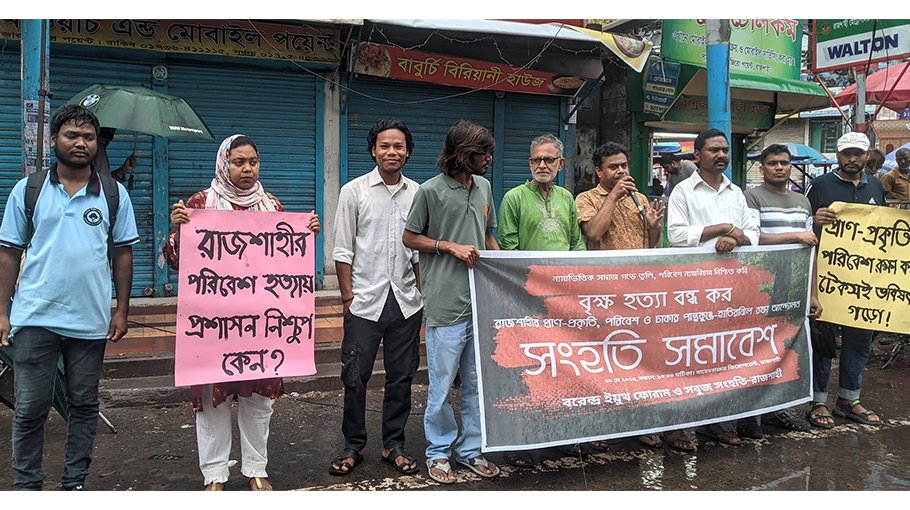Solidarity rally held in Rajshahi to protect wildlife, environment

A solidarity rally organised by Barendra Youth Forum and Sabuj Samhati , Rajshahi , was held demanding to protect Rajshahi's wildlife, environment and Dhaka's Panthakunja and Hatirjheel at Saheb Bazar Zero Point in the city on Friday (May 30).
Moderated by Barendra Youth Forum Joint General Secretary Atiqur Rahman Atiq , the rally was presided over by Barendra Youth Forum Adviser Shahidul Islam and was attended, among others, by former General Secretary of Rajshahi Press Club Aslam-ud-Daula, social activist Waliur Rahman Babu, Organizing Secretary of the National Indigenous Council Subhash Chandra Hembram, President of the Rajshahi district Indigenous Youth Council Upen Ravidas and General Secretary of the Bangladesh Students' Federation, Rajshahi, Nadim Sinha.
The speakers at the rally said that in addition to indiscriminate tree felling and pond filling in the Barendra region of Rajshahi, there is a festival of illegal pond digging on agricultural land in rural areas. In November last year, the Rajshahi Textile Mills was leased to the PRAN-RFL Group. According to information from the Department of Environment, PRAN-RFL group has felled about four hundred trees in Rajshahi Textile Mills compound and filled a pond located inside the textile mill. Although the High Court made it mandatory to obtain permission for cutting trees, the Pran-RFL Group indiscriminately cut down trees by ignoring the High Court order. Inspite of such environmental destruction, no visible action was seen to be taken from the Department of Environment, the District Administration and other concerned authorities.
The speakers also mentioned that the noise and air pollution were increasing at an alarming rate in Rajshahi, known as the city of peace. According to a study by the Barendra Environment Development Voluntary Organization, the average noise level on May 10, 2025 (Saturday) was 97.2 decibels, which was 90 decibels in 2022.
The noise level in the Rail gate area has increased by more than seven decibels in the last four years.
In last three years, (2022-2024) air pollution in the city has increased by 47 micrograms or 64.47 percent. There is no proper traffic management and an alarming anarchy on the roads, and noise and air pollution are increasing but there is no necessary action and management.
On the other hand, the Dhaka Elevated Expressway's FDC-Palashi connection road is an example of discriminatory, unlicensed, abducting citizens' rights and state waste. The Dhaka Elevated Expressway project has been run through corruption, mismanagement and lack of coordination since its inception, which has become a cause of environmental crisis and public sufferings. In violation of existing environmental, reservoir or biodiversity protection policies and laws, the Hatirjheel reservoir has been filled and its category has been changed through this project, and about 2,000 trees in Panthakunja have been cut down.
According to documents obtained through the Right to Information Act, there is no environmental clearance for conducting construction work in Hatirjheel and Panthakunja. Many people and organisations have expressed solidarity with the movement to protect Panthakunja Park and Hatirjheel Reservoir. Even though three important advisors of the Interim Government visited there and promised to take action to protect Hatirjeehl and Panthakunja Park, no discussions or solutions have been found even after five months.
Today, on the 6th month of the movement - the 168th day, various demands have been made from this solidarity rally in Rajshahi, including bringing all development projects across the country under environmental and public health accountability, not implementing any development projects by felling trees and filling ponds of Rajshahi. Speakers demanded to take legal action against criminals who destroy the environment and to establish an Environmental Court in Rajshahi.
The speakers said that the Interim Government would immediately cancel projects that are against the environment and public interest. It will set an example for Bangladesh by building a just society and ensuring environmental justice.



